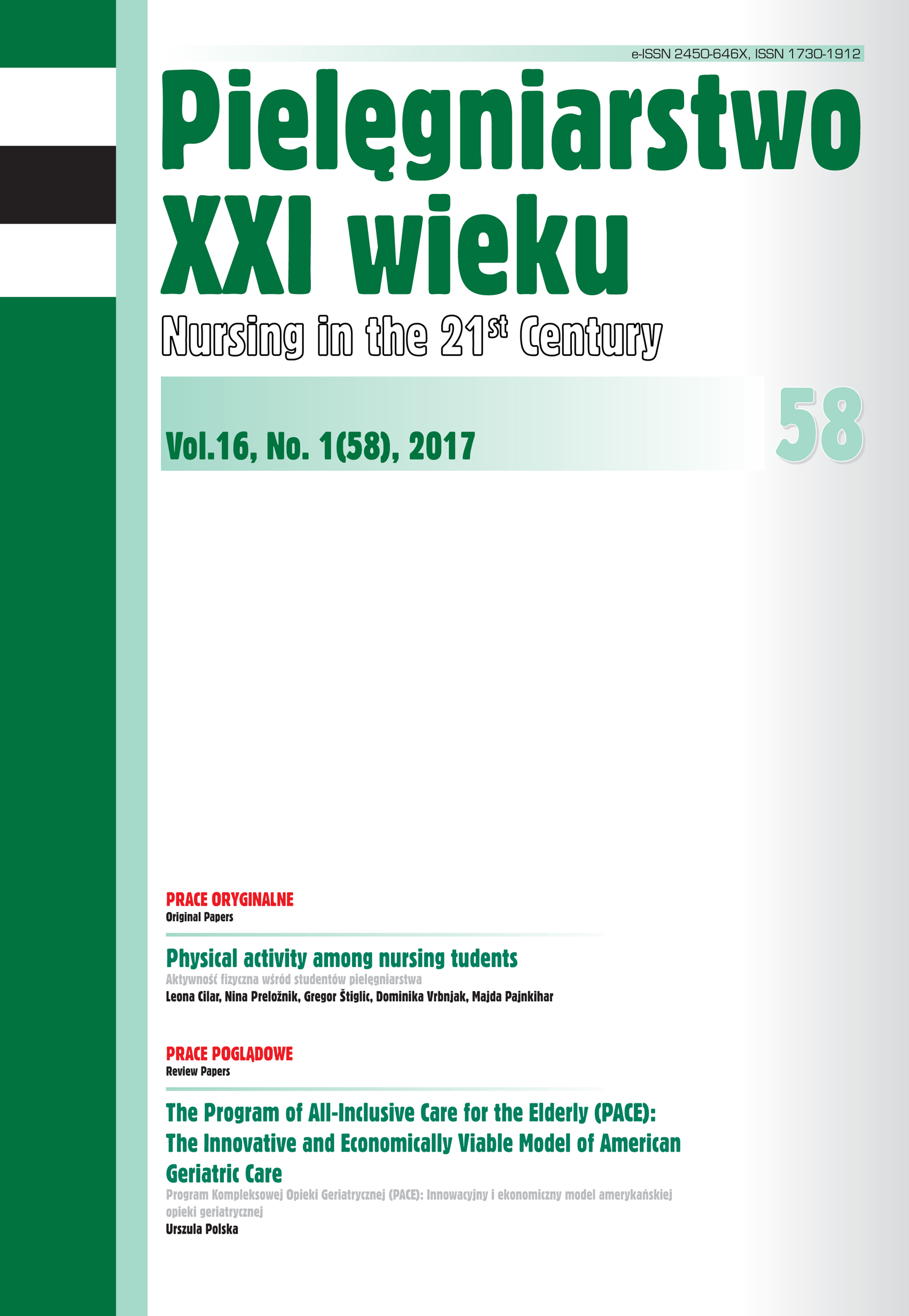Trust in the doctor-patient relationship in the light of the latest research
DOI:
https://doi.org/10.1515/pielxxiw-2017-0009Keywords:
trust, doctor, patientAbstract
TRUST IN THE DOCTOR-PATIENT RELATIONSHIP IN THE LIGHT OF THE LATEST RESEARCH
Introduction. Trusting the medical staff, especially the doctor is a fundamental part of the success of the treatment process. Appropriate level of trust in a doctor-patient relationship affects the patient’s compliance with the physician’s recommendations and motivates patient to fight the disease. Over the last few years, numerous studies have been conducted on the level of trust in medical staff, especially doctors.
Aim. The aim of this study is to present reports on research on patients’ trust in doctors of various specialties. The work will be done in the form of analysis of literature, including statistical data, scientific papers and professional literature.
Results. Discussed topic has been raised in various countries, such as Poland, the United Kingdom, Nigeria, China. Presented overview of the work of research shows that the level of trust in the doctors of various specialties is unequal.
Conclusions. It is extremely important that the analyzes are conducted on the topic, and as a consequence some appropriate measures to strengthen relationships and trust in doctors should be taken.
References
1. Waszkiewicz A, Białecka B. Kształtowanie usług medycznych na postawie oceny i odczucia pacjenta. Zeszyty Naukowe Politechniki Śląskiej, Organizacja i Zarządzanie. 2012; 63: 260.
2. Maciąg A, Sakowska I. Rola i prawa pacjenta w obszarze, jakości usług zdrowotnych. Studia i Materiały - Wydział Zarządzania UW. 2006; 1: 50-62.
3. Kemicer-Chmielewska E, Rotter I, Kotwas A, i wsp. Ocena, jakości usług medycznych przez pacjentów z uwzględnieniem wybranych zmiennych socjodemograficznych. Ann Acad Med Stetin. 2013; 59(2): 143-147.
4. Grynchutskyi V, Machuga N. Zdrowotne, społeczne i ekonomiczne wymiary, jakości usług zdrowotnych. Zeszyty Naukowe Uniwersytetu Przyrodniczo-Humanistycznego w Siedlcach, Administracja i Zarządzanie. 2013; 97: 125-132.
5. Robbins StP, DeCenzo DA. Podstawy zarządzania. Warszawa: PWE; 2002.
6. Fukuyama F. Zaufanie. Kapitał społeczny a droga do dobrobytu. Warszawa-Wrocław: PWN; 1997.
7. Palka J, Winkler R. Bariery budowy kultury zaufania. Zeszyty Naukowe Akademii Ekonomicznej w Krakowie. 2006; 715: 27-40.
8. Thom DH, Wong ST, Guzman D, et al. Lekarz zaufanie pacjenta: opracowywanie i zatwierdzanie nowego środka. Ann Fam Med. 2011; 9(2): 148-154.
9. LoCurto J, Berg MG. Trust in healthcare settings: Scale development, methods, and preliminary determinants, SAGE Open Med. 2016; 4: doi: 10.1177/2050312116664224.
10. Opinie o błędach medycznych i zaufaniu do lekarzy. Komunikat z badań. Warszawa: CBOS; 2014, s. 12-13.
11. Krajewska-Kułak E, Wróblewska K, Kruszewa R, i wsp. Ocena zaufania pacjent-lekarz z zastosowaniem skali Anderson i Dedrick. Probl Hig Epidemiol. 2008; 89(3): 414-418.
12. Krajewska-Kułak E, Chilicka M, Kułak W, i wsp. Assessment of physician-patient trust in the obstetrics and gynecology departments in Poland and Greece. Ginekol Pol. 2011; 82: 905-910.
13. Moczydłowska A, Krajewska-Kułak E, Kózka M, i wsp. Oczekiwania chorych wobec personelu lekarskiego. Hygeia Public Health. 2014; 49(1): 142-151.
14. Aloba O, Mapayi B, Akinsulore S, et al. Trust in Physician Scale: Factors tructure, reliability, validity and correlates of trust in a sample of Nigerian psychiatric outpatients. Asian Journal of Psychiatry. 2014; 11: 20-27.
15. Banerjee A, Sanyal D. Dynamics of doctor-patient relationship: A cross-sectional study on concordance, trust, and patient enablement. J Family Community Med. 2012; 19(1): 12-9.
16. Lodr K, Ibrahim K, Kumar S, et al. Measuring trust in healthcare professionals - a study of ethnically diverse UK cancer patients. Clin Oncol (R Coll Radiol). 2012; 24(1): 13-21.
17. Garg R, Shen C, Sambamoorthi N, et al. Type of Multimorbidity and Patient-Doctor Communication and Trust among Elderly Medicare Beneficiaries. Int J Family Med. 2016, doi: 10.1155/2016/8747891.
18. Shan L, Li Y, Ding D, et al. Patient Satisfaction with Hospital Inpatient Care: Effects of Trust, Medical Insurance and Perceived Quality of Care. PLoS One. 2016; 11(10): e0164366.
19. McLaughlin MM, Simonson L, Zou X, et al. African migrant patients’ trust in Chinese physicians: a social ecological approach to understanding patient-physician trust. PLoS One. 2015; 10(5): e0123255.
20. Da-Hai Z, Ke-Qin R, Zhi-Ruo Z. Patient Trust in Physicians: Empirical Evidence from Shanghai, China. Chin Med J 2016; 129(7): 814-818.
21. Dong E, Liang Y, Liu W, et al. Construction and validation of a preliminary Chinese version of the Wake Forest Physician Trust Scale. Med Sci Monit. 2014; 20: 1142-1150.
22. Jones DE, Carson KA, Bleich SN, et al. Patient trust in physicians and adoption of lifestyle behaviors to control high blood pressure. Patient Educ Couns. 2012; 89(1): 57-62.
23. Graham JL, Shahani L, Grimes RM, et al. The Influence of Trust in Physicians and Trust in the Healthcare System on Linkage, Retention, and Adherence to HIV Care. AIDS Patient Care STDS. 2015; 29(12): 661-667.
24. Thompson AE, Anisimowicz Y, Miedema B, et al. The influence of gender and other patient characteristics on health care-seeking behaviour: a QUALICOPC study. BMC Fam Pract. 2016; 17: 38.
25. Gopichandran V, Chetlapalli SK. Dimensions and Determinants of Trust in Health Care in Resource Poor Settings – A Qualitative Exploration. PLoS One. 2013; 8(7): e69170.
Published
Issue
Section
License
Copyright (c) 2017 Authors

This work is licensed under a Creative Commons Attribution-NonCommercial-NoDerivatives 3.0 Unported License.




